PRESERVING A MILITARY LEGACY FOR FUTURE GENERATIONS
The following Reflections represents SMC Rick N. Riggins’s legacy of his military service from 1973 to 1997. If you are a Veteran, consider preserving a record of your own military service, including your memories and photographs, on Togetherweserved.com (TWS), the leading archive of living military history. The following Service Reflections is an easy-to-complete self-interview, located on your TWS Military Service Page, which enables you to remember key people and events from your military service and the impact they made on your life. Start recording your own Military Memories HERE.
Please describe who or what influenced your decision to join the Navy.

My decision to enlist in the Navy was solely based on the draft that was in effect at the time, and I went in knowing that my number would be called. The funny thing is after I enlisted, the draft was abolished, but it was the best decision I ever made. My family’s history was Army, and I really wanted to change the paradigm, so I went into the Navy.
Those along the way influenced me, like BM1 Mundell, who retired as either a BMCS or BMCM, as he could see something in me that others at the time could not. Also, SMSN Booker T. Arradondo and SN Cap Tasali were with me on my first unit, the USS Tripoli (LPH-10). SMSN Arradondo challenged me at all times to be the best I could be while we were together at our watch station. SN Tasali was always even-tempered, quiet, and a kind shipmate and I learned a lot from him as well. Later in my career, our paths crossed again along my military journey.
Later in my career, others were instrumental and have become close friends long after my retirement.
Whether you were in the service for several years or as a career, please describe the direction or path you took. What was your reason for leaving?

The direction I took was making the US Navy a career in the field of communications as a Signalman, and later was Leading CPO for many of the Operations Departments on units I was assigned over my career.
I really loved the Navy, the opportunities to travel to distant shores, and all those great men and women I served with along my journey. I didn’t want to leave the unit I was serving on at the time, let alone retire, but I had reached the end of my career and had to retire because, at the time, the Navy had adopted tenure limits based on our paygrades.
If you participated in any military operations, including combat, humanitarian and peacekeeping operations, please describe those which made a lasting impact on you and, if life-changing, in what way?

Initially, I was assigned to the USS Tripoli (LPH-10), involved in Operation End Sweep as the war in Vietnam was winding down. The SS Mayaquez was recaptured as part of the task group while serving on the USS Lang (FF-1060) with the Coral Sea Battlegroup. I was assigned duties at the repatriation camp as part of the repatriation efforts of the Vietnamese people into the United States while I was in the Philippines in 1975.
I would have to say the one thing that seemed to have the most significant impact on me was helping with the repatriation efforts and the humanitarian effort. It taught me a great deal about self-sacrifice and personal survival based on what they had gone through and were getting ready to do as part of the effort to become citizens of the United States.
Improvise, adapt, and overcome was the battle cry for us, and we did that valiantly while involved in that operational effort to help ensure their safety, security, and smooth transition.
Of all your duty stations or assignments, which one do you have fondest memories of and why? Which was your least favorite?
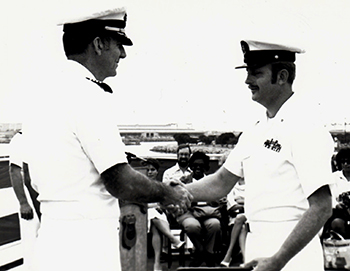
Probably the fondest for me were two assignments, both outside of my normal operational assignments. The first was as Assistant Security Officer/Physical Security Chief while stationed in Sasebo, Japan. I had the opportunity to work with so many fine individuals from all parts of the Navy, the US Marine Corps, and the Japanese community who were so dedicated to their jobs. It was an exciting, memorable experience. The location wasn’t too bad either because it afforded me the opportunity to see many other parts of Japan while I was stationed there.
The second duty station was being assigned to work with the Department of the Army at the Military Entrance Processing Command in Lansing, Michigan, where I had the opportunity to work with all the military branches and assist them in their recruiting goals. I worked for a Marine Major, and my direct supervisor initially was an Army Captain/Major, followed by a Navy Lieutenant, both of whom were outstanding to serve with. During that tour of duty, I had the opportunity to personally see 87,430 men and women face to face as they enlisted and went to their respective basic training/boot camp facilities.
Like most, I have to admit that my least favorite command was my last command, no matter how good it was, and my best command was the one I was headed to next. Next, I headed back overseas to Sasebo, Japan, to be the Leading Chief of Operations aboard the USS Germantown (LSD-42).
From your entire military service, describe any memories you still reflect back on to this day.
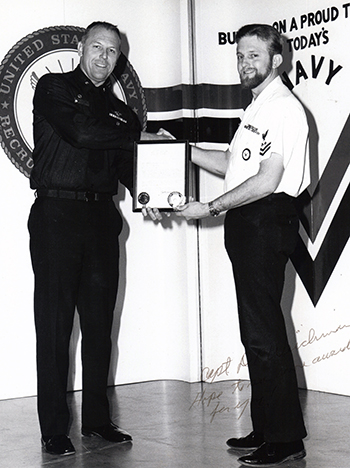
As mentioned earlier, working in the Philippines during the Vietnamese Repatriation efforts probably impacted me the most at the end of the war.
There were so many wonderful memories of countries visited also. Still, they were all special in their own unique way, from the various foods experienced in each one to the people I encountered in each port of call. While in Japan, I had the privilege of working with some great Japanese counterparts who excepted me as a service member and as a friend for life, and I still reminisce of the wonderful experiences shared with each and every one of those wonderful people.
One funny experience was on the day I left for basic training. My Recruiter told me not to worry about anything that was coming because I would adapt and love it. He went on to say, ” You’re gonna love it so much that you’re gonna re-enlist and then come back home to be my replacement.” I assured him that I would do my time and then get out, and he laughed at me. However, I had grown fond of the Navy at the end of my enlistment, so I re-enlisted.
My assignment upon re-enlisting was Recruiting Duty in my hometown. So when I reported for duty, my old Recruiter in Charge was getting ready to transfer to a new duty station. When he saw me as a now young SM2, he laughed and said, “I told you that you were gonna be my replacement!” and so it was I took his place in a roundabout way by being in the same zone in the city next to where I raised my hand and began my tour in the same zone I was recruited from.
What professional achievements are you most proud of from your military career?

Probably making/ achieving each pay grade was my finest achievement. Ultimately, making Chief Petty Officer and being qualified as an Enlisted Surface Warfare Specialist tops the qualification list, and training Junior Officers to navigate/pilot the various vessels I was assigned. This was the most challenging qualification because it required more than the normal enlisted personal qualifications for on-the-job assignments. It also encompassed learning things about the unit I was assigned to in their entirety, including qualifications of other ratings, systems, propulsion, weapons, ship handling, and Officer qualifications as well along the way.
My particular qualification board was nearly 7 hours because the Commanding Officer wanted to test me and see just how much I really knew. After all, he wanted to make sure he could trust me to operate the bridge as an OOD underway, as well as any other emergencies I might have encountered.
The medal I am most proud of, if there is such a thing, came while serving with USMEPCOM, and I received the Joint Service Commendation Medal. All the other medals I received are also special based on being in those locations performing vital operations for the greater good at the time.
Of all the medals, awards, formal presentations and qualification badges you received, or other memorabilia, which one is the most meaningful to you and why?

Again the Enlisted Surface warfare qualification is at the top of the list because of the depth and scope of what it took to earn the badge and qualification for the award at the time. I achieved the qualification, followed by the Joint Service Commendation Medal, and worked with so many outstanding members of the various Armed Forces during that tour of duty with USMEPCOM.
The service medals are all significant in that they are a reflection of where I was at a specific time in history during my career, involving vital operations for the good of the country, and how I was seen by my superiors while serving under their command in the Navy, and the United States of America.
Lastly, the Humanitarian Service Medal for work in Vietnam and the repatriation efforts while I was in the Philippines because of what I assisted in doing to help them personally, professionally, and humanitarian.
Which individual(s) from your time in the military stand out as having the most positive impact on you and why?

As I mentioned earlier, there were several. Still, early in my career, the most influential ones were SMSN Booker T. Arradondo, who was instrumental in helping to keep my skills and proficiency at a high operating level, SN Cap Tasali, for his quiet, even-tempered nature and kindness that had a big impact on my life.
BM1 Mundell, while I was a young SMSN, for seeing something in me that others couldn’t /wouldn’t see that helped me to decide to stay the course and make the Navy my career goal.
Countless others along the way who helped to stoke the burners to my boiler and keep the fires burning inside so I could keep going and forging out my future.
List the names of old friends you served with, at which locations, and recount what you remember most about them. Indicate those you are already in touch with and those you would like to make contact with.
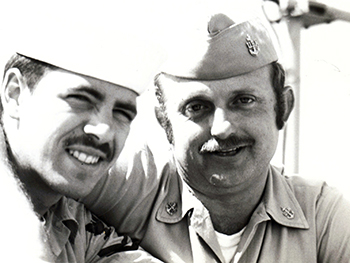
SMSN Arradondo, SN Tasali, both of the USS Tripoli, BM1 Mundell, who was my LPO while temporarily assigned to Port Operations in Port Hueneme, California.
I would like to one day contact SN Tasali again and some other SM1’s that I served with, Jeff Carter and Max Kirk. Randy Stype, SM2 Rivers, and Chief John K. Woods.
Can you recount a particular incident from your service, which may or may not have been funny at the time, but still makes you laugh?

When we were on our maiden voyage after commissioning the USS Wadsworth (FFG-9), one of my young seaman was so sick he had to leave the helm to go below and had made it to the bottom of the ladder puking in a big trash bag. When he finished, I yelled down at him and asked if he was okay and if he was done. His response was, “I think so,” I then yelled to him again, saying, “Good, save the big chunks for me.” with that, he started puking again, and although it was a terrible thing to say and have him experience, I get a chuckle out of it every time I think of it.
What profession did you follow after your military service and what are you doing now? if you are currently serving, what is your present occupational specialty?

After my military service, I went into Ministry and worked full time for the United States Postal Service until being retired. I went back to college a few years after retiring from active duty and got my Bachelors degree in Family Life Education (Social work) and my Master’s Degree in Counseling. My present occupation is RETIRED from all jobs and responsibilities except that of Grandpa and great-grandpa, and I love being a grandfather to 21 Grand Children and seven great-grandchildren.
What military associations are you a member of, if any? what specific benefits do you derive from your memberships?

Life Member of the Vietnam Veterans of America, Life Member of the Veterans of Foreign Wars, Life Member of the American Legion, and benefits are varied for the associations.
Still, each has a great Service Officer for any of my Veterans Affairs needs/issues that I can go to if needed.
In what ways has serving in the military influenced the way you have approached your life and your career? What do you miss most about your time in the service?
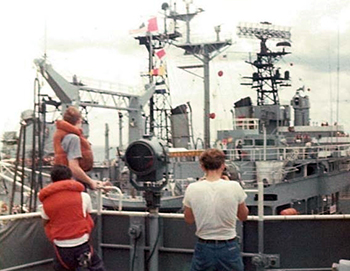
In many ways, I don’t take anything for granted and live each day as if it were my last because it could be, and I have learned to give of myself, serve, and love those around me more because of the things I went through in the military. My career was a constant display of “Show and tell.” I learned this behavior from my father and grandfather and mirrored it throughout my career in teaching others to be the best they could be to enjoy their experiences while on active duty.
Based on your own experiences, what advice would you give to those who have recently joined the Navy?
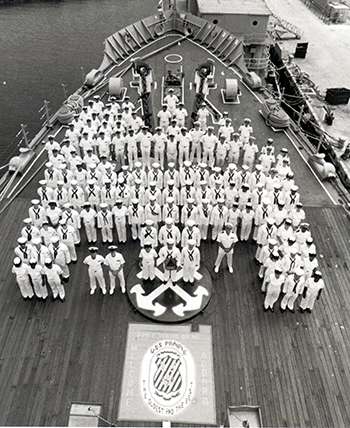
I would say to respect the leadership and keep your eyes and ears open because opportunity only knocks on occasion. You need to be ready, willing, and able to accept it when it comes along; otherwise, you will have missed the boat and be left behind.
Also, live by the three words burned into you from the beginning of your training each and every day of Honor, Commitment, and Courage, as they will carry you through and beyond your time in the military.
In what ways has togetherweserved.com helped you remember your military service and the friends you served with.
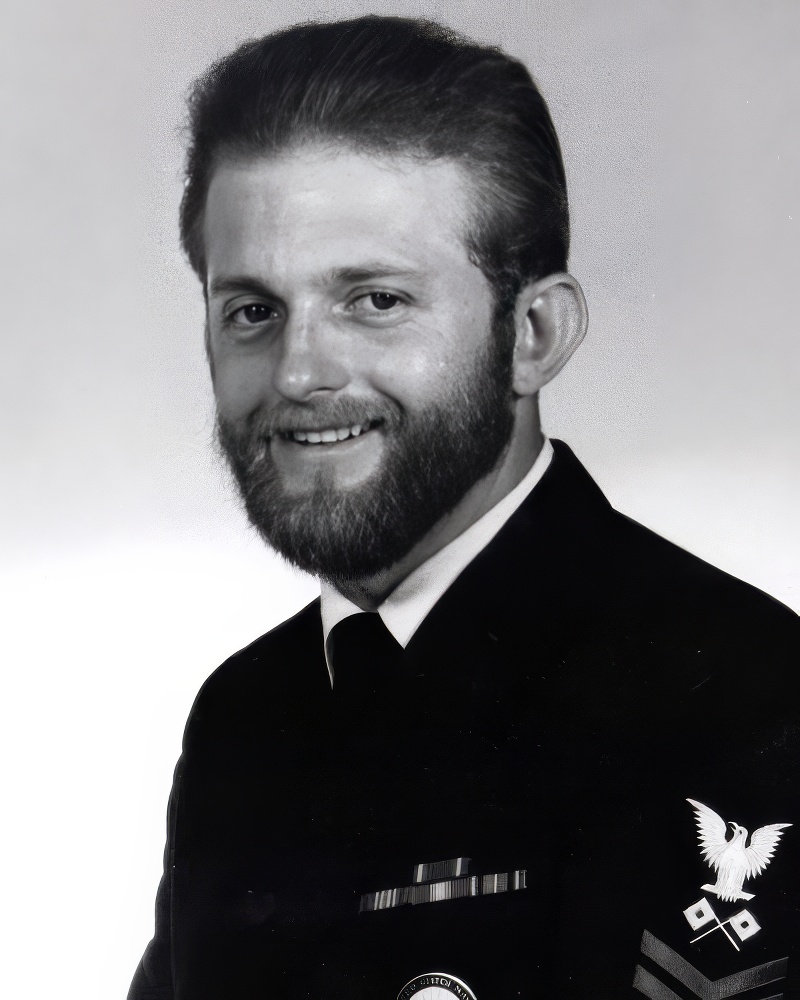
It has caused me to rethink and reflect on many situations, places, people, and things that have affected my life as a result of having been a Navy Sailor since I have been able to write my thoughts down on this site.
PRESERVE YOUR OWN SERVICE MEMORIES!
Boot Camp, Units, Combat Operations
Join Togetherweserved.com to Create a Legacy of Your Service
U.S. Marine Corps, U.S. Navy, U.S. Air Force, U.S. Army, U.S. Coast Guard

Hey shipmate. I was in company 057. Right behind you. I remember your cc. I retired in 98. I was in aviation. Small world